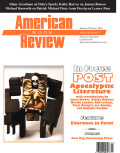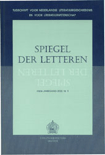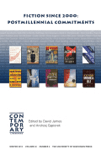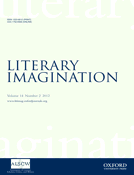
REVISTA DE LITERATURA
Scope & Guideline
Illuminating the path of literary excellence since 1996.
Introduction
Aims and Scopes
- Interdisciplinary Literary Studies:
The journal emphasizes an interdisciplinary approach to literary studies, integrating insights from history, sociology, cultural studies, and philosophy to deepen the understanding of literary texts and their contexts. - Focus on Hispanic Literature:
A core area of the journal is the exploration of literary works from Hispanic authors, both contemporary and historical, addressing themes such as identity, memory, and cultural heritage. - Critical Analysis of Literary Movements:
The journal regularly publishes critical analyses of various literary movements, including modernism, postmodernism, and contemporary trends, examining their impact on literature and society. - Exploration of Literary Forms and Genres:
It offers comprehensive studies on diverse literary forms and genres, including poetry, narrative fiction, drama, and essays, analyzing their evolution and significance in the literary canon. - Thematic Studies on Cultural and Historical Contexts:
The publication focuses on thematic studies that relate literary works to broader cultural and historical contexts, such as colonialism, war, and social change, enhancing the understanding of literature as a reflection of societal issues.
Trending and Emerging
- Memory and Trauma in Literature:
There is a notable increase in publications focusing on themes of memory and trauma, particularly in the context of historical events such as the Spanish Civil War and Franco's repression, highlighting literature's role in processing collective and individual experiences. - Interdisciplinary Approaches to Literature:
The journal is increasingly publishing works that adopt interdisciplinary methodologies, combining literary analysis with insights from psychology, sociology, and cultural studies to explore complex themes, such as identity and cultural memory. - Exploration of Gender and Identity:
Emerging studies increasingly focus on gender and identity, examining how literature reflects and shapes contemporary understandings of these concepts, particularly in relation to feminist and queer theories. - Digital Humanities and Literature:
The rise of digital humanities is becoming a prominent theme, with articles exploring the intersection of literature and technology, including digital narratives, online literary communities, and the impact of digital culture on literary practices. - Ecocriticism and Environmental Literature:
There is a growing emphasis on ecocriticism and environmental themes in literature, reflecting contemporary concerns about climate change and ecological crises, and how these issues are represented in literary texts.
Declining or Waning
- Traditional Historical Narratives:
There seems to be a decrease in the focus on traditional historical narratives, particularly those that strictly adhere to chronological storytelling or biographical accounts, as the journal shifts towards more innovative and thematic explorations of literature. - Classical Literary Theory:
The journal has seen a reduction in articles that strictly apply classical literary theories, such as formalism or structuralism, as contemporary literary criticism increasingly favors more diverse and inclusive theoretical frameworks. - Regional Studies with Limited Scope:
Studies that focus narrowly on specific regional literatures without connecting them to broader cultural or transnational contexts appear to be less frequent, indicating a shift towards more globalized literary discussions. - Conventional Genre Studies:
There is a noticeable decline in conventional genre studies that do not engage with contemporary interpretations or cross-genre influences, as the journal's scope expands to embrace hybrid forms and innovative narrative techniques. - Static Author Studies:
The journal has moved away from static studies centered solely on individual authors without consideration of their works' intertextuality or socio-cultural implications, reflecting a broader trend towards relational and contextual literary analysis.
Similar Journals

LITERATUR UND KRITIK
Engaging Minds Through Literary AnalysisLITERATUR UND KRITIK, published by Otto Muller Verlag, stands as a significant journal in the field of Literature and Literary Theory. This Austrian journal, with its ISSN 0024-466X, offers a platform for critical examination, analysis, and discourse on literature from various historical and cultural contexts. Despite its current standing in the Q4 category of literature rankings, it provides an invaluable resource for researchers and practitioners committed to exploring the evolving landscape of literary criticism. This journal is particularly notable for its convergence of scholarly thought from 2009 to 2024, fostering a rich dialogue among academics, critics, and students alike. While it does not offer open access, its valuable insights into contemporary and historical literary studies make it a respected source within the academic community. The journal ensures that contributors and readers alike engage deeply with significant literary themes, nurturing both scholarly and creative pursuits.

Anales de Literatura Hispanoamericana
Illuminating the Path of Hispanic Literary ExplorationAnales de Literatura Hispanoamericana, published by UNIV COMPLUTENSE MADRID, SERVICIO PUBLICACIONES, is a prominent journal dedicated to the field of Hispanic literature and literary theory. With a history of publication spanning from 1996 to 2023, this journal provides an essential platform for scholars and researchers exploring diverse aspects of literature within the Hispanic cultural context. Though it currently operates without an open-access model, its scholarly contributions are vital for advancing the understanding of literary phenomena in Spanish-speaking countries. As a Q3 ranked journal in the Literature and Literary Theory category, it engages a global audience interested in high-quality research, and its Scopus ranking places it among the notable publications in the arts and humanities. The journal aims to foster interdisciplinary dialogue, showcasing innovative research and critical analyses that enhance the appreciation of Hispanic literary heritage. Whether you are a seasoned researcher or an emerging scholar, Anales de Literatura Hispanoamericana serves as a crucial resource for advancing your understanding of the rich tapestry of Hispanic literature.

AMERICAN BOOK REVIEW
Navigating the Rich Tapestry of Literary CritiqueAMERICAN BOOK REVIEW is a pivotal journal in the fields of Cultural Studies and Literature and Literary Theory, published by the University of Houston, Victoria - Art & Science. Esteemed for its critical engagement with contemporary literary discourses, the journal provides a platform for scholars and practitioners to explore diverse narratives and theoretical frameworks that shape our understanding of literature. With an ISSN of 0149-9408 and E-ISSN 2153-4578, it serves as an essential resource for those seeking to deepen their insights into the intersection of literature and culture. Although positioned in the Q4 category for both Cultural Studies and Literature in 2023, the journal emphasizes the importance of inclusivity in academic dialogue, aiming to elevate lesser-heard voices in literary critique. Despite its challenging Scopus ranking, its commitment to fostering innovative scholarship makes it a noteworthy asset for researchers, professionals, and students alike. The journal's address is located at 3007 N Ben Wilson, Victoria, TX 77901, United States.

World Literature Studies
Exploring the Depths of Global Literary DiscourseWorld Literature Studies is a leading academic journal published by the Institute of World Literature at the Slovak Academy of Sciences, dedicated to advancing the field of literary studies. With an ISSN of 1337-9275 and an E-ISSN of 1337-9690, this journal has established itself as a prominent platform for scholarly research and discourse, earning a prestigious Q1 ranking in the Literature and Literary Theory category as of 2023, placing it in the top 25% of journals in its field according to Scopus metrics. Operating from Slovakia, the journal caters to a global audience, highlighting diverse perspectives in world literature and fostering interdisciplinary collaboration. Though it currently offers no Open Access option, it maintains a rigorous peer-review process that ensures the quality and integrity of published works. Researchers, students, and literary professionals alike will find the journal's comprehensive articles and critical analyses essential for staying informed about the latest developments and trends in literature and literary theory.

SPIEGEL DER LETTEREN
Fostering Insightful Dialogues in Literary StudiesWelcome to SPIEGEL DER LETTEREN, a distinguished journal published by PEETERS in Belgium, with an impressive Q1 ranking in Literature and Literary Theory. Since its inception in 1996, this journal has been at the forefront of literary scholarship, engaging researchers, professionals, and students in profound discussions and analysis of literary texts, theories, and cultural contexts. Although it does not currently offer open access, its rigorous editorial standards ensure that each published work contributes significantly to the field, promoting the advancement of knowledge and understanding in literature. With an established reputation, SPIEGEL DER LETTEREN serves as a vital resource for those seeking to explore the nuances of literary studies, supported by a diverse range of articles that reflect both contemporary and historical perspectives.

CONTEMPORARY LITERATURE
Illuminating Contemporary Narratives and TheoriesCONTEMPORARY LITERATURE, published by the prestigious University of Wisconsin Press, stands as a vital platform for scholars and enthusiasts within the field of literary studies. With its ISSN 0010-7484 and E-ISSN 1548-9949, this journal has established itself as a respected source of innovative research across various dimensions of literature and literary theory. Holding an impressive Q2 ranking in the 2023 category of Arts and Humanities, this publication not only reflects current trends but also fosters critical discourse around contemporary authors and movements from 2002 to 2024. Engaging articles submitted to CONTEMPORARY LITERATURE enhance our understanding of narrative forms and their cultural relevance, making it an essential read for academics, professionals, and students alike. While the journal is not open access, its impact within the literary community continues to grow, as evidenced by its Scopus rank of #616 out of 1106. For those dedicated to exploring the evolving landscape of literature, CONTEMPORARY LITERATURE is a must-have in one's scholarly toolkit.

Literary Imagination
Navigating the Complexities of Literary NarrativesLiterary Imagination, published by Oxford University Press, is an esteemed journal that delves into the intricate world of literature and literary theory. With the ISSN 1523-9012 and the E-ISSN 1752-6566, this journal serves as a pivotal platform for scholars and practitioners in the field, striving to advance the understanding of imaginative literature from various critical perspectives. Boasting a 2023 rank of #751 out of 1106 in the Arts and Humanities category on Scopus, and categorized in the Q3 quartile for literature and literary theory, the journal is recognized for its contribution to the academic discourse. It aims to foster a vibrant academic community through the publication of innovative research, critical essays, and interdisciplinary studies that engage with the complexities of literary creation from 2009 to 2024. While currently not an open access journal, its rich repository of scholarly work remains accessible to researchers, professionals, and students aiming to enrich their understanding of literary narratives and their theoretical frameworks.

Tydskrif vir letterkunde
Bridging Theory and Practice in Literary ScholarshipTydskrif vir letterkunde is an esteemed open-access journal published by UNIV PRETORIA, dedicated to the exploration and discourse surrounding literature and cultural studies in the South African context and beyond. With an impressive Q1 ranking in Literature and Literary Theory and a Q2 ranking in Cultural Studies as of 2023, this journal serves as a vital platform for researchers, professionals, and students alike, aiming to bridge theoretical concepts with contemporary literary practices. Since becoming open access in 2015, it has broadened its reach, allowing for greater collaboration and knowledge dissemination within the global academic community. By welcoming diverse voices and innovative research, Tydskrif vir letterkunde not only contributes to the rich tapestry of literary scholarship but also fosters critical dialogue around cultural issues, ensuring its relevance in an ever-evolving field.

GIORNALE STORICO DELLA LETTERATURA ITALIANA
Unveiling the Rich Tapestry of Italian LiteratureGIORNALE STORICO DELLA LETTERATURA ITALIANA is a distinguished journal published by CASA EDITRICE LOESCHER that serves as a critical platform for the exploration and analysis of Italian literary history. With an ISSN of 0017-0496, this journal encompasses a broad spectrum of topics within the field of literature and literary theory, contributing to the academic dialogue surrounding Italy's rich literary heritage. Although it is not openly accessible and has discontinued its coverage in Scopus since 2021, the journal has established its presence in the scholarly community, being ranked in the 18th percentile within the literature and literary theory category. Its historical significance and focus on literature position it as an essential resource for researchers, professionals, and students keen on deepening their understanding of Italian literature and its impact on cultural studies. By engaging with the contents of this journal, readers will gain valuable insights into the evolution of literary discourses and the role of Italian literature in contemporary society.

Forum for World Literature Studies
Exploring the Boundaries of Global Literary DiscourseForum for World Literature Studies, published by KNOWLEDGE HUB PUBL CO LTD, stands as a pivotal platform within the humanities, particularly in the realms of Cultural Studies and Literature and Literary Theory. Established in 2009, this academic journal has quickly ascended to a prestigious Q1 ranking as of 2023, reflecting its significant impact in advancing scholarly discourse. With an impressive Scopus ranking—165th out of 1106 in Literature and Literary Theory, and 548th out of 1304 in Cultural Studies—it offers a critical space for researchers, professionals, and students dedicated to exploring the relationships between literature and cultural phenomena. Operating out of Hong Kong, the journal provides a rich selection of peer-reviewed articles that delve into global literary trends, making it an essential resource for anyone wishing to contribute to or deepen their understanding of world literature. With the prospect of open access options enhancing its accessibility, the Forum for World Literature Studies invites submissions that challenge conventional interpretations and foster innovative thinking in literary studies.